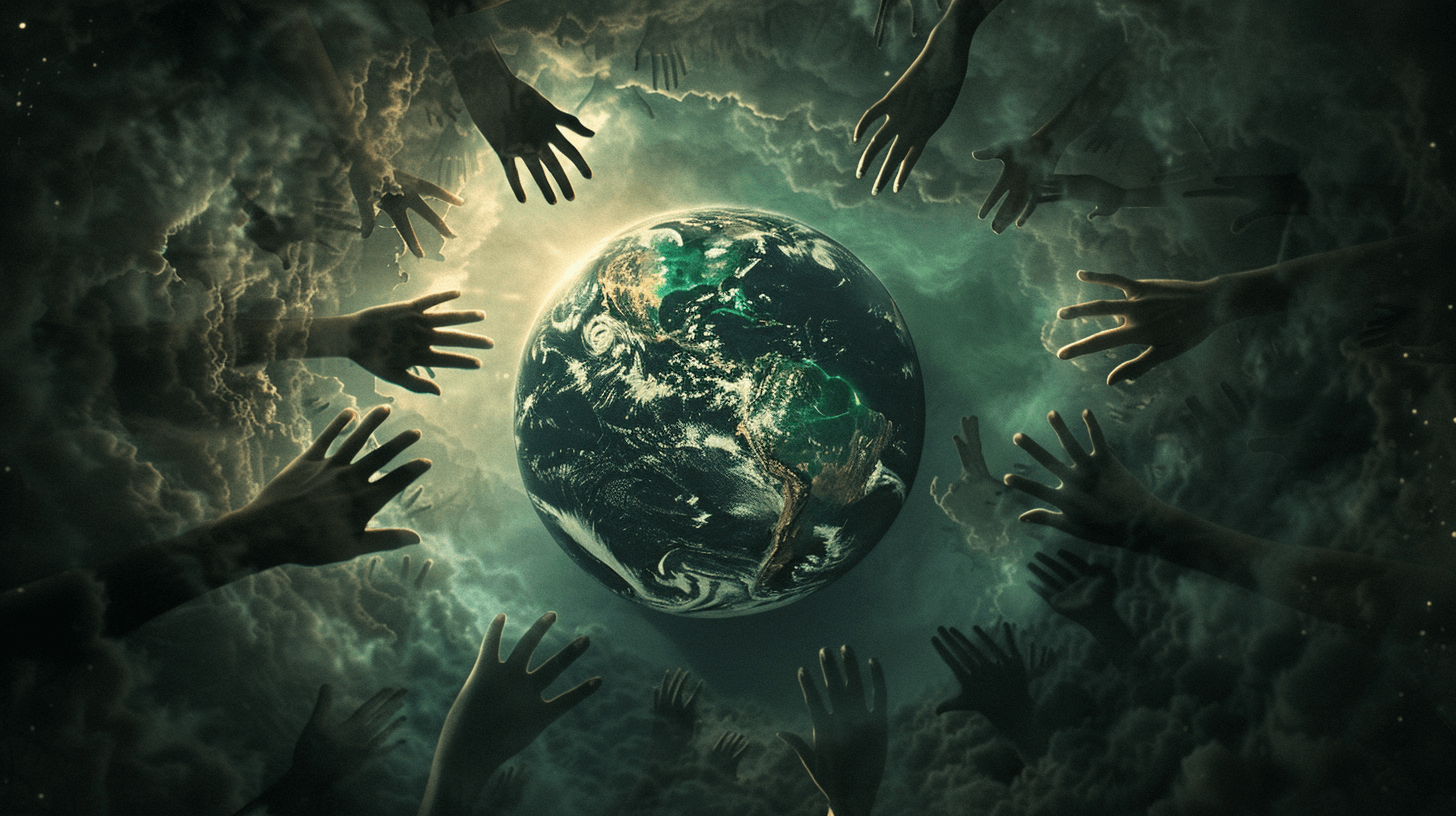Introduction

Humanity stands at a crossroads. While we witness the dawning of a new era of technological advancement, global connectivity, and heightened individual awareness, there remains a profound barrier to true global transformation: the collective ego. The concept of the ego has long been understood as an individual phenomenon—a mental construct that creates a sense of separation, rooted in personal identity, fears, and desires. But what remains less discussed, and yet far more pervasive, is the collective ego—the shared identity, beliefs, and unconscious conditioning that bind entire societies, nations, and even the world to a limited view of reality.
This collective ego has proven to be a powerful force in shaping global culture, politics, religion, and economics. Yet, it is also the primary obstacle preventing humanity from achieving collective enlightenment—a state in which we move beyond separation and embrace a unified consciousness that transcends the boundaries of race, nationality, and belief systems. To understand how humanity can evolve beyond its current limitations, we must first deconstruct this collective ego and expose the ways in which it restricts our growth, connection, and spiritual potential.
The promise of global enlightenment is not a utopian fantasy. It is the natural evolution of consciousness—one that is possible only when we collectively awaken from the illusion of separateness, ego-driven identities, and the false narratives that dominate our shared reality.
The Nature of the Collective Ego
At its core, the ego is the mind’s attempt to create a sense of identity—a false self based on the past, future, and external validation. It seeks to protect and enhance this identity by associating with certain ideas, roles, and relationships while rejecting others. The ego thrives on division, comparison, and conflict because it defines itself in opposition to something else. As a result, the ego is deeply invested in the maintenance of separateness.
The collective ego operates in a similar way, but on a larger scale. It is the sum of shared identities, beliefs, and conditioned patterns that arise when groups of people come together—whether in the form of nations, religions, races, political affiliations, or even cultural movements. These collective identities create a sense of belonging, but they also reinforce the illusion of separateness from the rest of humanity. The collective ego thrives on division, just as the individual ego does, and it uses fear, conflict, and comparison to strengthen its grip on society.
Consider the deeply ingrained nationalism that exists across the world. Nationalism is a form of collective ego, a belief in the superiority or distinctiveness of one’s country or people over others. It draws boundaries between “us” and “them” and creates a sense of pride in one’s identity as a member of a particular nation. But at its core, nationalism is rooted in fear—the fear of losing that identity, of being invaded or diluted by others. This fear breeds division and conflict, often leading to war, discrimination, and intolerance.
Similarly, religious fundamentalism is another manifestation of the collective ego. While the essence of most religious teachings is love, unity, and transcendence, the egoic mind distorts these teachings into rigid doctrines that claim exclusivity over truth. Religious groups define themselves in opposition to other faiths, often creating conflict in the name of spiritual superiority. The collective ego here masquerades as righteousness, but its true motivation is to assert control and power.
These examples are just a few of the many ways the collective ego influences human behavior. From racial superiority to political partisanship, the collective ego thrives on the illusion of difference and separation. And as long as we remain unconscious of its existence, it will continue to block our path to global enlightenment.
The Illusion of Separation
The most insidious aspect of the collective ego is the illusion of separation it perpetuates. By identifying with a particular group, we unconsciously reinforce the belief that we are separate from others—separate from other nations, races, religions, and ultimately from life itself. This illusion of separateness is the root of all suffering, both individually and collectively.
At the heart of every major spiritual tradition is the recognition that oneness is the true nature of existence. In Hinduism, this oneness is referred to as Brahman, the ultimate reality that underlies all things. In Buddhism, it is the realization of interconnectedness—that all beings are part of a vast web of life, with no inherent separation between self and other. In Christianity, Jesus spoke of the Kingdom of Heaven being within, a state of unity with the divine that transcends the egoic mind.
Yet, the collective ego works tirelessly to obscure this truth. It reinforces the idea that we are separate from one another, that our well-being depends on defending and promoting our group’s interests, often at the expense of others. This is why so much of the world’s suffering is rooted in conflict—conflict between nations, races, political ideologies, and religions. The collective ego needs conflict to survive because conflict strengthens the illusion of separateness.
But the truth is that the boundaries we draw between ourselves and others are illusory. At the deepest level, we are not separate individuals but expressions of the same universal consciousness. The divisions that the collective ego creates are like the surface waves of an ocean—separate and distinct in appearance, but all arising from the same underlying body of water. When we see through the illusion of separation, we recognize that we are all one, interconnected and interdependent.
How the Collective Ego Blocks Global Enlightenment
Global enlightenment—the collective awakening of humanity to its true nature—can only occur when we move beyond the limitations of the collective ego. As long as we cling to ego-driven identities, we will continue to perpetuate division, fear, and conflict. The collective ego blocks global enlightenment in several key ways:
1. Fear and Division: The collective ego thrives on fear—fear of the other, fear of loss, fear of change. It encourages us to see the world in terms of “us versus them,” creating an endless cycle of division and conflict. This fear-based mindset prevents us from embracing our shared humanity and recognizing the unity that exists beneath our surface differences.
2. Attachment to Identity: The collective ego is deeply invested in maintaining its identity, whether that identity is nationalistic, religious, racial, or ideological. This attachment to identity creates rigidity and resistance to change. When we are attached to our collective identity, we become defensive and closed off to new ideas or perspectives that challenge our worldview.
3. Cultural Conditioning: From the moment we are born, we are conditioned by the collective ego. We inherit the beliefs, values, and biases of our culture, which shape our perception of reality. This conditioning creates a narrow lens through which we view the world, limiting our ability to see the broader truth of our interconnectedness.
4. Conflict and Competition: The collective ego thrives on conflict and competition because it reinforces the illusion of separateness. Nations compete for resources, religions compete for followers, and political parties compete for power. This competition creates a world in which cooperation and collaboration are seen as weaknesses rather than strengths, preventing us from working together to solve global challenges.
Transcending the Collective Ego
The path to global enlightenment lies in transcending the collective ego. This requires a shift in consciousness—both individually and collectively. While individual enlightenment is an essential step, the true transformation occurs when entire societies begin to awaken to the truth of oneness and interconnectedness.
Here are the key steps we must take to transcend the collective ego:
1. Awareness: The first step in transcending the collective ego is to become aware of its existence. We must recognize the ways in which we are unconsciously conditioned by our cultural, national, and religious identities. By shining the light of awareness on these patterns, we can begin to loosen their grip on our consciousness.
2. Embrace Oneness: We must cultivate a deep understanding of oneness—the recognition that all beings are interconnected and interdependent. This requires us to move beyond the surface differences that the collective ego emphasizes and to see the underlying unity that connects all life.
3. Let Go of Attachment: Just as we must let go of the individual ego to achieve personal enlightenment, we must let go of our attachment to collective identities. This does not mean abandoning our cultural or national heritage, but rather recognizing that these identities are not who we truly are. We are not defined by our nationality, race, or religion; we are infinite consciousness, temporarily expressing itself through these forms.
4. Promote Global Cooperation: To transcend the collective ego, we must promote cooperation and collaboration over competition and conflict. This means creating systems and structures that prioritize the well-being of all humanity, rather than the interests of individual nations or groups. Global challenges such as climate change, poverty, and inequality can only be solved through collective action, guided by the awareness of our shared destiny.
Toward a Global Awakening
The collective ego has kept humanity locked in a cycle of fear, division, and conflict for far too long. But as more individuals awaken to the truth of oneness, we have the potential to initiate a global awakening—a shift in consciousness that transcends the limitations of the collective ego and ushers in a new era of peace, unity, and enlightenment.
This is not a utopian fantasy; it is the natural evolution of human consciousness. Just as individual enlightenment is possible through the dissolution of the ego, so too is global enlightenment possible through the dissolution of the collective ego. As we embrace the interconnectedness of all beings and recognize our shared essence, we pave the way for a future rooted in harmony, understanding, and profound spiritual realization.
Embracing this shift does not require us to lose our unique cultural identities or personal histories; rather, it involves seeing them as part of a greater whole that celebrates diversity within the unity of existence. By transcending the collective ego, we can truly step into a realm of global enlightenment where peace and compassion are the foundations of our interactions.
Conclusion
The journey to transcend the collective ego is challenging and profound. It calls for a radical shift in perception from division to unity, from conflict to peace, and from isolation to interconnectedness. By committing to this path, humanity can not only envision but actualize a world where collective enlightenment shapes our actions and interactions. Let us move forward with courage, love, and the deep knowing that our collective awakening is not just possible, but inevitable.

Feel your suffering within. I teach seekers of self a clear path toward enlightenment.
Phillip Lew helps you achieve a clear path to enlightenment, guiding you to uncover your true self. Explore his journey and transform your life with his book, Feel Your Suffering Within. With a profound understanding of human existence, Phillip’s mission is to lead others towards awakening and authentic living.








